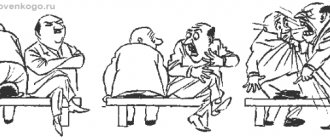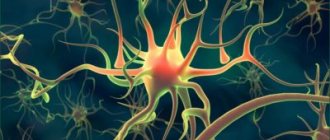What type of temperament is the best and how to determine it by a person’s behavior? Have you noticed that some people try to fit into the company, behave relaxed and confident, others, on the contrary, remain in the shadows and do not attract attention. This does not mean that one of them is worse or better, just that each person has a different temperament and, accordingly, different behavior patterns.
The basis of personality
Temperament is a certain biological basis on which personality is built. Temperament determines the mechanisms of psychological activity and the ability to socially adapt. On its basis, social properties of the psyche are formed. From a physiological point of view, temperament is a type of higher nervous activity.
Scientists consider Hippocrates to be the father of the theory of human temperament. Later, the philosopher and physician Claudius Galen developed this theory and became the author of the scientific treatise “Correct Measure.” This work describes four types of temperament according to basic biological substances. Blood plays a key role in the formation of the sanguine type. For a choleric person, the main substance is bile. The phlegmatic type develops under the strong influence of phlegm. And melancholic in a person is determined by the so-called “black bile”.
No type of temperament is found in its pure form. Every person has a basic temperament, developing or suppressing it depending on circumstances. In different situations, the same person is capable of exhibiting traits of all four types.
Sanguine
These are cheerful and active individuals. They rarely lose heart and try to find a way out of any situation. People are drawn to them because they are also great speakers. Their speech is quite competent, voluminous and interesting. Unlike choleric people, they do not manifest themselves as dictators, but they can start and lead a crowd.
Sanguine people are very active. They find it difficult to sit in one place. Their daily routine is quite busy. People tend to travel and change their place of residence. Please note that among sanguine people there are quite a few actors and artists. They know how to make people fall in love with themselves, demonstrating their love for life and everything new.
The degree of excitation of the nervous system is high, and the threshold of inhibition is low. This means that a person perceives the world through the prism of some of his illusions. But it cannot be said that a sanguine person is constantly in the clouds. Yes, he can remember ridiculous events, but forget significant dates, such as the birthday of loved ones, for example.
Sanguine people are able to please. They show their emotions, are not afraid to cry, sympathize, and laugh. Their sincerity is not feigned. These people want to be open, but they also want to be treated the same way. It is easy to recognize a sanguine person in a crowd. He will be among a large number of people who listen to him carefully. When talking, a sanguine person gesticulates a lot, which is another feature for recognition. They are distinguished by extraordinary thinking. These people are always learning something, trying to learn new things, changing their haircuts, image, and the interior of their apartment.
Sanguine people are good friends. They do not abandon a person in trouble, and always rush to provide all possible assistance. In their personal lives they turn out to be flighty personalities. Their sociability prevents them from building a harmonious union. Not all partners understand the need of sanguine people to communicate with other people.
Flaws:
- gets down to business, but rarely completes it;
- does not like monotony;
- often overestimate their capabilities.
Advice
:
Sanguine people should work on developing willpower, learn discipline and rely only on their own strength.
Properties of temperament
Each type of temperament is determined by the presence of specific properties, namely:
Extraversion and introversion
These qualities are based on emotional reactions, on the speed of volitional actions.
Activity and passivity
These properties show a person’s reaction to negative events and difficulties, and also determine the degree of his endurance, perseverance and determination.
Sensitivity
It manifests itself in the strength of the influence of external stimuli that force the psyche to react in one way or another. Different people react to the same event in completely different ways.
Reactivity
This term refers to an involuntary reaction of the psyche to irritating factors (they can be both external and internal).
Plasticity and rigidity
These qualities show a person’s ability to adapt to the environment and adapt to new circumstances.
Reactive Activity Rate
This property determines how quickly the psyche reacts to external stimuli.
Emotional excitability
Using this property, you can determine how much a person is able to control his emotions, speech and mental reactions.
Choleric
He is a fairly strong-willed person with a strong character. He is not afraid of difficulties and is ready to take on difficult tasks. He is confident in his abilities, therefore he is able to adapt in difficult situations, protect himself and the weak. They make excellent speakers and leaders. Inner strength and the ability to persuade help them successfully lead a large group of people.
The choleric person is quite jealous, so in his personal life he treats his partner as property. He easily falls in love and becomes attached to a person. In family life he initiates scandals.
It is difficult to restrain emotions, so you should expect straightforward statements from a choleric person. Nevertheless, he has no equal in oratory skills - he is able not only to speak beautifully, but also to convince, winning in an argument.
Choleric children are distinguished by their capriciousness. They try to attract the attention of all family members. In adolescence they become hyperactive, changing tastes and hobbies quite often.
Minuses:
- incontinence;
- impulsiveness;
- haste;
- straightforwardness;
- harshness towards the actions of others;
- periodic aggression.
Advice
:
It is recommended that representatives of this type of temperament work on their emotions. In order not to rush headlong into the pool and do something stupid, you should use the ten-second technique. It lies in the fact that before taking a decisive step, you need to count to ten in your head and then act. Usually, the ardor and intensity of passions disappear, allowing you to make a more informed decision.
How is temperament different from character?
A person's temperament should not be identified with his character. The first term includes a set of genetic characteristics of the psyche. Temperament is formed in utero, it cannot be changed, but can only be superficially corrected by working on oneself and correctly setting life priorities.
Character is formed throughout life, changing in one direction or another. Interacting in the social sphere, individuals exchange behavioral and mental experiences, influence others and are subconsciously influenced by others.
Phlegmatic people
If among your friends there is a balanced person who has an analytical mind, then most likely he is a phlegmatic person. This guy is pretty lazy. He doesn't like to fuss, preferring to just go with the flow. He thinks through all his steps in advance and is not considered an impulsive person.
The phlegmatic person is stingy with emotions. It is difficult for him to show feelings of joy and pain. They won't shed a tear. Their emotional state resembles a scale. They are able to withstand heavy loads. This type of person is not the first to make contact. They find change difficult. If they have to change something suddenly, they feel disorientated for a while.
They are hard workers at work. It is not difficult for them to do monotonous work. Phlegmatic people are ready to understand the problem, analyze and remember a large amount of information.
This type of people is hidden and reserved. It is difficult for them to find new friends and be the first to show interest in the opposite sex. If he really likes someone, he will do everything to achieve their favor. Phlegmatic people start a family late. For them, this is a responsible step, so it takes them a long time to make a choice.
Disadvantages of the type:
- poorly adapt to changes;
- are not the first to make contact;
- show emotions sparingly.
- are slowly starting to work.
Advice
:
A recommendation for a phlegmatic person is to fight his laziness and isolation.
Decoding answers to the Eysenck test
Now you can start analyzing the answers. All 57 questions are divided into 3 groups, each of them corresponds to certain personality qualities. If your answer matches the one below, you can give yourself 1 point. And then count the number of points. Record the number of points in each group.
Truthfulness response group
The answer “yes” was expected to questions: 6, 24, 36. A negative answer to questions: 12, 18, 30, 42, 48, 54. By carrying out a simple calculation, we can check how honest we were when answering the questions. If you get a total of more than 5 points, your answers are false. Most likely, when answering, you were guided by the desire to please yourself and others. If the test shows that the answers are untruthful, the analysis need not be continued.
Emotional Stability Response Group
You can score up to 24 points in this section. Positive answer to questions 2, 4, 7, 9, 11, 14, 16, 19, 21, 23, 26, 28, 31, 33, 35, 38, 40, 43, 45, 47, 50, 52, 55, 57. The fewer points you score, the more stable your psyche is. And vice versa, the more points you count, the more sensitive and suspicious person you are.
A group of answers to determine the attitude towards the outside world
The lower your score in this group, the more introverted you are (an introvert), and the higher your score, the more likely you are to be an extrovert. The answer is “yes” to questions: 1, 3, 8, 10, 13, 17, 22, 25, 27, 37, 39, 44, 46, 49, 53, 56. A negative answer to questions: 5, 15, 20, 29, 32, 34, 41, 51.
Now, on the photo below, mark the points of the points you received. The horizontal line shows the scores from the introvert-extrovert group, and the vertical line shows the value of responses to emotional stability.
The point you find is a reflection of your temperament. The farther it is from the intersection of the axes, the more clearly your temperament is expressed. The proximity of the point to one of the axes indicates how mixed your temperament type is.
Having determined your psychotype, you can reasonably avoid uncomfortable situations and choose the right type of activity. Knowing your inner strengths will help you achieve your goals and develop your personal strengths.
Melancholic people
If you see a person who panics because of unimportant troubles, then this is a melancholic person. He tends to dramatize everything, experience depression and mood swings.
They view all events in life as black and white film. Melancholic people rarely rejoice, but often worry. They tend to hide their mood by putting on the mask of a happy person. Because of this, there is a high percentage of suicides among melancholic people.
At work they are just as uninitiative, sluggish and lazy. It is difficult for them to quickly get involved in the process, analyze and adapt. This type does not remember information well.
A person experiences multiple complexes. He is not confident in himself and is sensitive to criticism. It cannot be found in noisy companies or among most colleagues at work. Such individuals prefer to sit in the archive, library, or work as a storekeeper. It is difficult for a melancholic person to find a soul mate or friend. Their pessimistic attitude scares off many people. They choose one of the sanguine or choleric people as close friends. This is understandable. Melancholic people need care, which can be given by strong personalities. People get married late or simply rarely. Because of their indecisiveness, many partners simply leave without waiting for action. If they manage to arrange a family life, then they will be happy there with a strong personality. For melancholic people, a home is a fortress and a reliable rear, so they arrange it with special love.
Flaws:
- indecisiveness and self-doubt;
- depression;
- mood swings;
- difficulty perceiving the world.
You should not expect courageous actions from a person. But melancholic people also have advantages. These individuals are very kind and sympathetic. It is not difficult for them to lend a helping hand and share food with those in need. They understand how difficult it is to remain alone in a strange world.
Advice:
A melancholic person should not withdraw into himself. It is recommended to travel, dance, or find another hobby you like that will distract you from pessimistic thoughts.











